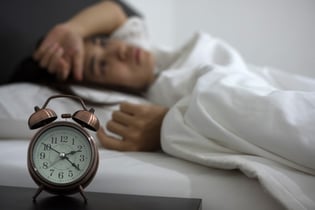Just another night in the land of paralysis - Reeve Foundation
 The other night was typical of most, at least most of mine. It was, however, probably not typical for the average individual who crawls between the sheets to seek eight hours of peaceful slumber to fuel whatever is to follow the next day.
The other night was typical of most, at least most of mine. It was, however, probably not typical for the average individual who crawls between the sheets to seek eight hours of peaceful slumber to fuel whatever is to follow the next day.
I probably should explain.
A skiing accident 31 years ago has become a distant memory to me, but the resulting Spinal Cord Injury (SCI) and the Quadriplegia (AKA Tetraplegia) that remain are a daily reminder that nothing stays the same. The injury means that I am completely paralyzed from the chest down and have very limited use of my hands and arms. This doesn't prevent me from living independently, along with the valuable assistance of others who volunteer or are paid to provide some part-time care that is vital to my health and independence.
Fortunately, I only need assistance in the morning and in the evening. I am alone, by choice, for most of the day and after I am placed in bed at night. Those nights are too often an occasion of restlessness instead of the restfulness I am seeking.
As I mentioned, last night was typical for me. My attendant started getting me into bed at about 9 p.m. This usually takes about 45 minutes, which may seem like a long time, but it is because it involves doing a range of motion of arms and legs, stretching out hands, placing socks to protect my feet from each other and propping me up on my side with pillows.
Those preceding steps, which take the most time, are not actually the most important to my ability to spend the night alone safely. The most crucial steps include hooking up my urinary drainage system plus making sure that my speakerphone, the tube leading to my water supply, control for my adjustable bed, and a touch light are all within reach. Blankets are placed on top of me and the television is tuned to my preferred channel with the volume turned down. The TV remote is placed where I can reach it so I can turn it off when I'm ready to actually fall asleep. I take my night medication and resting splints are placed on my hands to try to maintain function instead of letting them contract further.
While this may seem like an exhausting regimen, it doesn't make me tired. Instead, I usually stay awake for another hour before turning off the television and starting the most difficult part of the next few hours: trying to start and remain sleeping throughout the night. Sleep can become elusive, especially if I have difficulty turning off the television. I know that watching a screen at bedtime does not me fall asleep, but lying wide awake in a dark room does not appeal to me either.
No matter how hard I try to fall asleep, I hear every little noise for that first part of the night. The house makes creaking and cracking noises as it cools down, and it is not uncommon to hear scurrying across the back deck as raccoons or other critters check to see if the squirrels have left them any scraps of leftover squirrel trail mix as treats. The noises can reoccur during the night, and I am often awakened by a louder noise. When that happens, I always check the ceiling in order to see the time displayed from my projection clock, and remain awake while I count all of the lights on various battery chargers scattered around the room.
For me, six hours seems to be about the best I can do when it comes to sleep cycles. I normally am awake long before 6 a.m. no matter what time I fall asleep. The sound of the front door opener marks the arrival of my morning attendant, and relief that my long night has ended and my day can finally get started.
I recently learned that I am not the only person with an SCI who struggles with trying to get a decent night's sleep. Researchers at The University of Texas at Austin have found that among other things, our SCI can interfere with our body's circadian rhythms, and thus our sleep. While it is good that they have located the source of my insomnia until they find a cure I am afraid that this is just going to be one more thing to listen for as I wait for my circadian rhythm to start up on my next sleepless night.
© 2019 Michael Collins
Join Our Movement
What started as an idea has become a national movement. With your support, we can influence policy and inspire lasting change.
Become an Advocate